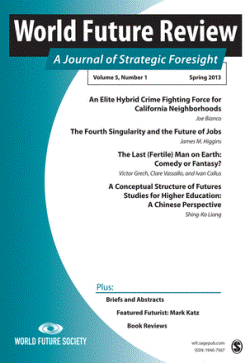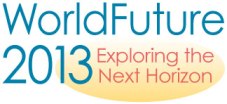What Trends Are Changing Your Future?
 The World Future Review spring issue is online! For a limited time, enjoy free access to the first SAGE-published issue of this dynamic journal of strategic foresight, including articles, book reviews and more on a range of current topics in the field of futures studies. WFR managing editor Lane Jennings writes in the introduction:
The World Future Review spring issue is online! For a limited time, enjoy free access to the first SAGE-published issue of this dynamic journal of strategic foresight, including articles, book reviews and more on a range of current topics in the field of futures studies. WFR managing editor Lane Jennings writes in the introduction:
Included in this issue are articles by Shing-Ko Liang on how traditional Chinese classics and innovative content are being combined to offer an undergraduate major, as well as graduate-level courses, in futures studies at Fo Guang University in Taiwan; another by James M. Higgins on the declining long-term outlook for jobs in the U.S. economy; and Michael Marien on Three Paths Forward—comparing prospects for Earth’s future as envisioned by Jorgen Randers, Ervin Laszlo, and the January 2012 Report of the UN Secretary-General’s High-Level Panel on Global Sustainability.
Our featured futurist interview this time is with professor Mark Katz of George Mason who offers his assessment of volatile conditions in the Middle East drawn from his research for his latest book: Leaving Without Losing: The War
on Terror After Iraq and Afghanistan.
Books reviewed in this issue include The New Limits of Education Policy by Roger Benjamin; Abundance by Peter H. Diamandis and Steven Kotler; Seeds, Science, and Struggle by Abby Kinchy; and The Infinite Resource by Ramez Naam.
WFR is accepting submissions from contributors worldwide whose essays fall within the broad spectrum defined as “futures research.” This encompasses both an evolving philosophy and a range of specific techniques primarily aimed at assisting decision-makers to better understand the potential consequences of present and future decisions by developing images of alternative futures.
 Interested in learning about the trends changing your future? This July, the World Future Society’s annual conference, WorldFuture 2013: Exploring the Next Horizon, brings together the world’s premier minds to discuss the long-range future of science, technology, humanity, government, religion and many other topics. Click here to learn more and watch highlights from last year’s conference.
Interested in learning about the trends changing your future? This July, the World Future Society’s annual conference, WorldFuture 2013: Exploring the Next Horizon, brings together the world’s premier minds to discuss the long-range future of science, technology, humanity, government, religion and many other topics. Click here to learn more and watch highlights from last year’s conference.






















































































